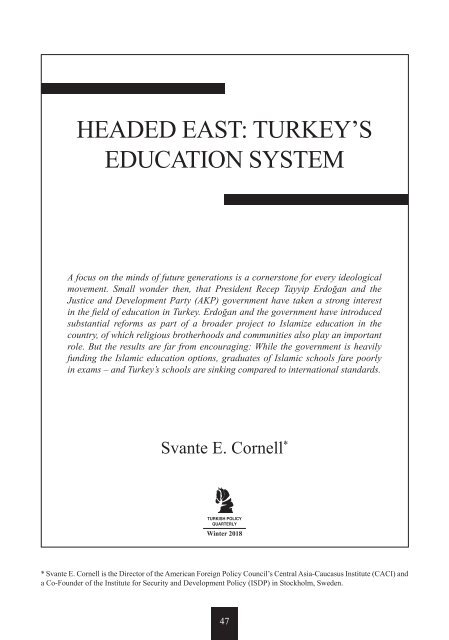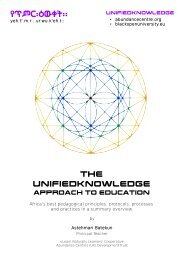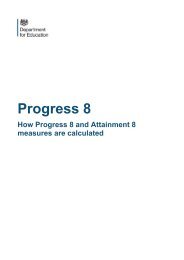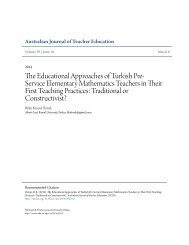Create successful ePaper yourself
Turn your PDF publications into a flip-book with our unique Google optimized e-Paper software.
HEADED EAST: TURKEY’S<br />
EDUCATION SYSTEM<br />
A focus on the minds of future g<strong>en</strong>erations is a cornerstone for every ideological<br />
movem<strong>en</strong>t. Small wonder th<strong>en</strong>, that Presid<strong>en</strong>t Recep Tayyip Erdoğan and the<br />
Justice and Developm<strong>en</strong>t Party (AKP) governm<strong>en</strong>t have tak<strong>en</strong> a strong interest<br />
in the field of education in Turkey. Erdoğan and the governm<strong>en</strong>t have introduced<br />
substantial reforms as part of a broader project to Islamize education in the<br />
country, of which religious brotherhoods and communities also play an important<br />
role. But the results are far from <strong>en</strong>couraging: While the governm<strong>en</strong>t is heavily<br />
funding the Islamic education options, graduates of Islamic schools fare poorly<br />
in exams – and <strong>Turkey’s</strong> schools are sinking compared to international standards.<br />
Svante E. Cornell *<br />
Winter 2018<br />
* Svante E. Cornell is the Director of the American Foreign Policy Council’s C<strong>en</strong>tral Asia-Caucasus Institute (CACI) and<br />
a Co-Founder of the Institute for Security and Developm<strong>en</strong>t Policy (ISDP) in Stockholm, Swed<strong>en</strong>.<br />
47
VOLUME 16 NUMBER 4<br />
SVANTE E. CORNELL<br />
I<br />
n February 2012, th<strong>en</strong> Prime Minister Erdoğan embarked on a wholesale<br />
reform of <strong>Turkey’s</strong> education system, and uttered the now famous<br />
statem<strong>en</strong>t that his governm<strong>en</strong>t was aiming at “raising pious g<strong>en</strong>erations.”<br />
1 The governm<strong>en</strong>t hastily rammed a law package through the<br />
parliam<strong>en</strong>t termed “4+4+4” without allowing any consultation or debate. While the<br />
law nominally ext<strong>en</strong>ded compulsory schooling by four years, making education<br />
compulsory for a full 12 years, in actuality it reduced compulsory public schooling.<br />
It also allowed for stud<strong>en</strong>ts to <strong>en</strong>ter vocational schools – including Islamic imam<br />
hatip schools – after fifth grade rather than from ninth grade.<br />
Erdoğan’s Reforms<br />
The controversy over imam hatip schools is hardly new. Erdoğan’s reforms came<br />
exactly 15 years after the February 1997 military interv<strong>en</strong>tion, which targeted<br />
<strong>Turkey’s</strong> first Islamist-led governm<strong>en</strong>t. In so doing, the military imposed compreh<strong>en</strong>sive<br />
changes to <strong>Turkey’s</strong> education system, most promin<strong>en</strong>tly by increasing<br />
compulsory schooling from five to eight years. This abolished the booming sector<br />
of imam and preacher schools, whose original purpose had be<strong>en</strong> to provide manpower<br />
for <strong>Turkey’s</strong> mosques and religious establishm<strong>en</strong>t. Prior to the 1997 coup,<br />
par<strong>en</strong>ts had be<strong>en</strong> free to <strong>en</strong>roll their childr<strong>en</strong> in schools of their choice from sixth<br />
grade onward – including the imam hatip schools that oft<strong>en</strong> b<strong>en</strong>efited from <strong>amp</strong>le<br />
private funding, and thus had smaller class sizes and better infrastructure than many<br />
vocational or academic middle schools. 2<br />
These schools are hardly Taliban-style madrasas: They provide a regular academic<br />
curriculum, but also an additional 13 hours per week of religious education. As a result<br />
of Islamist lobbying and fundraising at home and abroad, these schools had expanded<br />
expon<strong>en</strong>tially over past decades. 3 By 1997, they <strong>en</strong>rolled one in t<strong>en</strong> middle<br />
and high school stud<strong>en</strong>ts. The imam hatip schools had become a parallel system of<br />
education, which increasingly provided the voter base and manpower for <strong>Turkey’s</strong><br />
Islamist movem<strong>en</strong>t. 4 The 1997 interv<strong>en</strong>tion abolished these schools at the middle<br />
school level, and made it harder for graduates of imam hatip high schools to gain <strong>en</strong>trance<br />
to universities, with the exception of theology programs. 5 As int<strong>en</strong>ded, imam<br />
1<br />
“Dindar Nesil Polemiği,” [Pious G<strong>en</strong>eration Polemics] Habertürk, 2 February 2012, http://www.haberturk.com/polemik/haber/712088-dindar-nesil-polemigi<br />
2<br />
Howard A. Reed, “<strong>Turkey’s</strong> New Imam-Hatip Schools,” Die Welt des Islams, Vol. 4, No. 2/3 (1955), pp. 150-163.<br />
3<br />
Nilüfer Narlı, “The Rise of the Islamist Movem<strong>en</strong>t in Turkey,” MERIA Journal, Vol. 3, No. 3 (September 1999),<br />
http://goo.gl/Lh6ODB<br />
4<br />
S<strong>en</strong>cer Ayata, “Patronage, Party and State: The Politicization of Islam in Turkey,” Middle <strong>East</strong> Journal, Vol. 50, No. 1<br />
(Winter 1996), pp. 40-56.<br />
5<br />
See discussion in Svante E. Cornell, “Turkey: Return to Stability?,” Middle <strong>East</strong>ern Studies, Vol. 35, No. 3 (October<br />
1999), pp. 209-234, http://www.isdp.eu/images/stories/isdp-main-pdf/1999_cornell_turkey-return-to-stability.pdf<br />
48
HEADED EAST: TURKEY’S EDUCATION SYSTEM<br />
hatip <strong>en</strong>rollm<strong>en</strong>t declined dramatically, from 11 perc<strong>en</strong>t to 2 perc<strong>en</strong>t of stud<strong>en</strong>ts.<br />
This is what Erdoğan’s 2012 reform<br />
sought to reverse. But it w<strong>en</strong>t further. As<br />
Orhan Kemal C<strong>en</strong>giz has observed, the<br />
reforms turned “religious schools from<br />
a selective option to a c<strong>en</strong>tral institution<br />
in the education system.” 6 The reforms<br />
introduced <strong>en</strong>trance examinations for<br />
all high schools except the imam hatip<br />
schools; implying that all stud<strong>en</strong>ts who<br />
do not qualify for other schools would<br />
“40,000 stud<strong>en</strong>ts were<br />
automatically <strong>en</strong>rolled<br />
in imam hatip schools<br />
reportedly against<br />
their will.”<br />
have no choice but to <strong>en</strong>roll in imam hatip schools. By 2015, Erdoğan’s son Bilal<br />
Erdoğan, whose Turkey Youth and <strong>Education</strong> Service Foundation (Türkiye G<strong>en</strong>çlik<br />
ve Eğitime Hizmet Vakfı, TÜRGEV) foundation was put in charge of the expansion<br />
of the imam hatip schools, announced that the number of stud<strong>en</strong>ts <strong>en</strong>rolled had<br />
reached one million. 7 And no wonder: In August 2013, over 1,112,000 stud<strong>en</strong>ts took<br />
the placem<strong>en</strong>t test for high schools with an academic program; yet there were only<br />
363,000 slots available. Those that did not make the cut had to choose betwe<strong>en</strong><br />
vocational schools, imam hatip schools, and a variety called “multi-program high<br />
schools,” whose availability was distinctively sketchy. 8 40,000 stud<strong>en</strong>ts were automatically<br />
<strong>en</strong>rolled in imam hatip schools reportedly against their will. 9<br />
Erdoğan’s reforms ext<strong>en</strong>ded beyond boosting imam hatip schools. The reforms also<br />
greatly expanded the religious cont<strong>en</strong>t of regular high schools. The governm<strong>en</strong>t ext<strong>en</strong>ded<br />
the time stud<strong>en</strong>ts sp<strong>en</strong>d in a compulsory class on “Religious Culture and<br />
Moral Values,” which in spite of its name focuses <strong>en</strong>tirely on Sunni Islam. 10 In addition,<br />
elective courses such as “the life of Prophet Muhammad” and the “Qur’an”<br />
were introduced into the curriculum. In total, that meant that stud<strong>en</strong>ts could receive<br />
up to six hours of religious education per week. Since the number of total hours<br />
of school per week was short<strong>en</strong>ed, the proportional increase in religious education<br />
was ev<strong>en</strong> more marked. 11 In theory, religious classes are elective. However, the<br />
6<br />
Orhan Kemal C<strong>en</strong>giz, “Erdogan’s Reforms Meant to Educate ‘Pious G<strong>en</strong>eration,’” Al Monitor, 26 June 2014.<br />
7<br />
“Bilal Erdogan, Kocaeli’de Cami Açılışına Katıldı,” [Bilal Erdogan att<strong>en</strong>ded mosque op<strong>en</strong>ing in Kocaeli] AKhaber,<br />
12 June 2015, http://www.akhaber.com/ak-parti/haber-7411240/<br />
8<br />
Tülin Daloğlu, “Turkish Childr<strong>en</strong> Steered toward Religious <strong>Education</strong>,” Al Monitor, 19 August 2013; “Düz liseler<br />
kapandı yüzbinlerce öğr<strong>en</strong>ci açıkta kaldı,” t24.com.tr, 16 August 2013, http://t24.com.tr/haber/duz-liseler-kapandi-yuzbinlerce-ogr<strong>en</strong>ci-acikta-kaldi,237051<br />
9<br />
“Political Islamist ideals pushed via imam-hatip schools sparks anger,” Today’s Zaman, 25 August 2014.<br />
10<br />
For ex<strong>amp</strong>le, stud<strong>en</strong>ts are required to memorize a long list of Qur’anic verses and prayers, but no texts from any other<br />
religion. Christian and Jewish stud<strong>en</strong>ts continue to be exempt from the class, indicating that the governm<strong>en</strong>t itself views it<br />
as an education in Islam. Efe Kerem Sözeri, “Zorunlu Ant Kalktı, Ya Zorunlu Dua?” Bianet.org, 1 October 2013.<br />
11<br />
For ex<strong>amp</strong>le, the class on “human rights, citiz<strong>en</strong>ship and democracy” is no longer being taught. “Kuran dersi 6 saate<br />
çıkıyor,” Cumhuriyet, 3 December 2014, http://www.cumhuriyet.com.tr/haber/egitim/153983/Kuran_dersi_6_saate_cikiyor.html<br />
www.turkishpolicy.com<br />
49
VOLUME 16 NUMBER 4<br />
SVANTE E. CORNELL<br />
reality may be differ<strong>en</strong>t. The governm<strong>en</strong>t str<strong>en</strong>gth<strong>en</strong>ed its grip on the appointm<strong>en</strong>t<br />
of school administrators in 2014, and it is the administrators who have the authority<br />
to decide which elective classes are offered. 12<br />
Furthermore, islamization in Turkey has never relied solely on regulation; it is heavily<br />
influ<strong>en</strong>ced by community pressure. In many parts of the country, only highly<br />
dedicated secularist par<strong>en</strong>ts will expose themselves and their childr<strong>en</strong> to ostracism<br />
by choosing not to att<strong>en</strong>d religious courses. 13 A Newsweek story reports how a stud<strong>en</strong>t<br />
in a secular area of Istanbul was teased for being an atheist wh<strong>en</strong> granted an<br />
exemption from the supposedly elective class on the life of the Prophet that she had<br />
automatically be<strong>en</strong> assigned to. 14 If this happ<strong>en</strong>s in secular districts of Istanbul, the<br />
predicam<strong>en</strong>t of par<strong>en</strong>ts in towns and rural areas across the country is much more<br />
pronounced. It is not a coincid<strong>en</strong>ce that the class on the life of Muhammad was the<br />
most popular elective course in the first year it was being offered: It probably stems<br />
in equal part from a g<strong>en</strong>uine interest in Islam, and from a s<strong>en</strong>se that selecting that<br />
course is the best course to take to avoid ostracism.<br />
Reforms in 2010 made it possible to transform regular high schools into imam hatip<br />
schools; in 2012, this was made possible for middle schools as well. 15 In March<br />
2014, new legislation was adopted that provided the governm<strong>en</strong>t with a mandate<br />
to overhaul the <strong>en</strong>tire structure of the ministry of education, including terminating<br />
thousands of high-ranking officials, who could th<strong>en</strong> be replaced by political appointees.<br />
The governm<strong>en</strong>t claims that such processes only take place as a result of<br />
popular demand, but the record proves otherwise. In fact, governm<strong>en</strong>t plans to turn<br />
secular schools into imam hatip schools have led to street protests in a number of<br />
places. The process clearly appears to be supply-driv<strong>en</strong> rather than demand-driv<strong>en</strong>.<br />
As will be se<strong>en</strong> below, <strong>en</strong>rollm<strong>en</strong>t numbers make this clear.<br />
In 2017, the admission system for high schools changed again – to a model supposedly<br />
driv<strong>en</strong> by the geographic location of the applicant. The system was nevertheless<br />
rapidly criticized for tweaks that arguably push stud<strong>en</strong>ts into the expanding<br />
imam hatip sector. 16 Meanwhile, changes to the curriculum raised eyebrows for<br />
12<br />
“AK Party Aims to Mold Next G<strong>en</strong>eration in Political Islam,” Today’s Zaman, 14 June 2014; Alexander Christie-Miller,<br />
“Erdogan Launces Sunni Islamist Revival in Turkish Schools,” Newsweek, 16 December 2014.<br />
13<br />
On community pressure, see Binnaz Toprak et. al, Being Differ<strong>en</strong>t in Turkey: Religion, Conservatism, Otherization,<br />
Istanbul: Açık Toplum Vakfı, (2009), http://aciktoplumvakfi.org.tr/pdf/tr_farkli_olmak.pdf<br />
14<br />
Alexander Christie-Miller, “Erdogan Launces Sunni Islamist Revival in Turkish Schools,” Newsweek, 16 December<br />
2014, http://www.newsweek.com/2014/12/26/erdogan-launches-sunni-islamist-revival-turkish-schools-292237.html<br />
15<br />
Christie-Miller (2014).<br />
16<br />
“Y<strong>en</strong>i Liseye Giriş Raporu: Imam Hatip Tek Seç<strong>en</strong>ek,” [New High School Entrance Report: Imam Hatip Only<br />
Choice] Cumhuriyet, 30 January 2018, http://www.cumhuriyet.com.tr/haber/egitim/916506/Y<strong>en</strong>i_liseye_giris_raporu__imam_hatip_tek_sec<strong>en</strong>ek.html<br />
50
HEADED EAST: TURKEY’S EDUCATION SYSTEM<br />
doing away with the teaching of evolutionary<br />
biology in high schools. Per the<br />
Minister of <strong>Education</strong> İsmet Yılmaz,<br />
Darwin’s theory is too complex for high<br />
schoolers, and should only be taught at<br />
the university level. By contrast, the new<br />
curriculum downgrades the att<strong>en</strong>tion<br />
giv<strong>en</strong> to the founder of the Turkish<br />
Republic Mustafa Kemal Atatürk, and<br />
introduces the concept of jihad as a positive<br />
s<strong>en</strong>se of “love for homeland.” 17<br />
“Changes to the curriculum<br />
raised eyebrows for doing<br />
away with the teaching of<br />
evolutionary biology in high<br />
schools.”<br />
Tak<strong>en</strong> together, it is too early to say that the Turkish curriculum is being fundam<strong>en</strong>tally<br />
altered away from Western values. A rec<strong>en</strong>t analysis of Turkish textbooks<br />
suggests this is not yet the case. 18 But the governm<strong>en</strong>t’s steps are unequivocally in<br />
that direction; and it is not only the cont<strong>en</strong>t of curricula but the broader context of<br />
education that matters.<br />
Brotherhoods and Foundations<br />
In the interface betwe<strong>en</strong> religious and political life in Turkey, the key actors have<br />
long be<strong>en</strong> the religious brotherhoods and communities. These are almost universally<br />
products of the Nakşib<strong>en</strong>di Halidi (Naqshbandi-Khalidi) order, an orthodox<br />
Sufi movem<strong>en</strong>t that established its dominance on religious life in the country in the<br />
ninete<strong>en</strong>th c<strong>en</strong>tury. 19 Some – like the İsk<strong>en</strong>der Paşa and M<strong>en</strong>zil branches – remain<br />
formally within the order, while others like the Nurcu, Gül<strong>en</strong>ist and Süleymancı<br />
communities – are offshoot networks of the brotherhood. And the education sector<br />
has be<strong>en</strong> a key focus of the activity of these brotherhoods and communities.<br />
Ironically, the main brotherhood that did not prioritize education was the İsk<strong>en</strong>der<br />
Paşa, a branch that instead focused its att<strong>en</strong>tion on politics with astounding success:<br />
It produced <strong>Turkey’s</strong> first Islamist party, and can claim Necmettin Erbakan,<br />
Turgut Özal, Tayyip Erdoğan, and a host of AKP cabinet members as members.<br />
But while it was strong in politics, it lacked a considerable mass following. By contrast,<br />
the Gül<strong>en</strong> and Süleymancı movem<strong>en</strong>ts made education their main focus – the<br />
17<br />
Dan Bilefsky, “In <strong>Turkey’s</strong> New Curriculum, Ataturk, Darwin and Jihad Get Face-Lifts,” New York Times, 18 September<br />
2017, https://www.nytimes.com/2017/09/18/world/europe/turkey-curriculum-darwin-jihad.html<br />
18<br />
Hay Eytan Coh<strong>en</strong> Yanarocak, <strong>Turkey’s</strong> Curriculum Under Erdoğan: The Evolution of Turkish Id<strong>en</strong>tity (Jerusalem:<br />
IMPACT-se, 2016), http://www.impact-se.org/wp-cont<strong>en</strong>t/uploads/Turkey-Interim-Report_IMPACT-se.pdf<br />
19<br />
Svante E. Cornell and M.K. Kaya, “The Naqshbandi-Khalidi Order and Political Islam in Turkey,” Curr<strong>en</strong>t Tr<strong>en</strong>ds<br />
in Islamist Ideology (September 2015), http://hudson.org/research/11601-the-naqshbandi-khalidi-order-andpolitical-islam-in-turkey<br />
51<br />
www.turkishpolicy.com
VOLUME 16 NUMBER 4<br />
SVANTE E. CORNELL<br />
Süleymancı mainly in Qur’an courses, and the Gül<strong>en</strong> movem<strong>en</strong>t in secular schools.<br />
But they also sp<strong>en</strong>t considerable <strong>en</strong>ergy expanding the networks of thousands of<br />
stud<strong>en</strong>t dormitories, which provided a captive <strong>en</strong>vironm<strong>en</strong>t for the indoctrination of<br />
young minds into the t<strong>en</strong>ets of their particular movem<strong>en</strong>t.<br />
“The vacuum left in the<br />
education sector by the<br />
purge of the Gül<strong>en</strong>ists is now<br />
being filled largely by other<br />
religious brotherhoods and<br />
communities.”<br />
The focus on high-quality secular education<br />
provided the backdrop for the<br />
spectacular expansion of the Gül<strong>en</strong><br />
movem<strong>en</strong>t’s influ<strong>en</strong>ce, which allowed<br />
it to gain a commanding pres<strong>en</strong>ce in<br />
state institutions, as well as intellectual<br />
and business life. By 2002, that<br />
pres<strong>en</strong>ce had <strong>en</strong>abled the movem<strong>en</strong>t to<br />
pres<strong>en</strong>t itself as a key ally to the AKP<br />
and Erdoğan’s efforts to secure power –<br />
because Erdoğan’s own İsk<strong>en</strong>der Paşa<br />
brotherhood was simply too small to run <strong>Turkey’s</strong> expansive state bureaucracy.<br />
Seeing the Gül<strong>en</strong> movem<strong>en</strong>t as a kindred Islamist community, Erdoğan for almost a<br />
decade allowed the movem<strong>en</strong>t free rein in the bureaucracy – something that subsequ<strong>en</strong>tly<br />
almost led to his demise in the July 2016 failed coup.<br />
February of 2012, the month Erdoğan hastily launched his education reforms, was<br />
also the month wh<strong>en</strong> the AKP’s conflict with the Gül<strong>en</strong> movem<strong>en</strong>t exploded, wh<strong>en</strong><br />
Gül<strong>en</strong>ist prosecutors attempted to arrest Erdoğan’s close confidant Hakan Fidan,<br />
the head of the National Intellig<strong>en</strong>ce Organization. 20 Thus, while Erdoğan had a<br />
long-standing grudge against the secular establishm<strong>en</strong>t’s impact on the education<br />
system, the haste with which the reforms were conceived appear to have be<strong>en</strong> related<br />
to the struggle with the Gül<strong>en</strong> movem<strong>en</strong>t. Up to that point, Erdoğan had relied<br />
heavily on Gül<strong>en</strong>ist cadres to staff critical parts of the bureaucracy. Now, he felt he<br />
could no longer trust anyone who had att<strong>en</strong>ded Gül<strong>en</strong>ist schools. Indeed, by fall<br />
2013 he moved to close the movem<strong>en</strong>t’s vast network of schools providing preparatory<br />
classes for university <strong>en</strong>trance exams. 21<br />
Th<strong>en</strong> Erdoğan faced the vexing problem that reliable, Islamic manpower was in<br />
short supply. This problem became particularly acute following the mass purges<br />
targeting the Gül<strong>en</strong>ists that int<strong>en</strong>sified after the failed military coup of July 2016.<br />
Nature abhors a vacuum, and similarly, the vacuum left in the education sector by<br />
20<br />
Halil Karaveli, “The Coalition Crumbles: Erdoğan, the Gül<strong>en</strong>ists, and Turkish Democracy,” Turkey Analyst, 20<br />
February 2012, https://www.turkeyanalyst.org/publications/turkey-analyst-articles/item/395<br />
21<br />
Svante E. Cornell, “The Tale of the Split that brought Down Turkey,” Turkey Analyst, 6 September 2016, https://<br />
www.turkeyanalyst.org/publications/turkey-analyst-articles/item/563<br />
52
HEADED EAST: TURKEY’S EDUCATION SYSTEM<br />
the purge of the Gül<strong>en</strong>ists is now being filled largely by other religious brotherhoods<br />
and communities.<br />
In the pres<strong>en</strong>t <strong>en</strong>vironm<strong>en</strong>t in Turkey, details of this process are by necessity anecdotal.<br />
Yet it appears that the two main established communities that have moved to<br />
replace the influ<strong>en</strong>ce of the Gül<strong>en</strong>ists in the education sector are the Süleymancı<br />
and the Ismailağa groups. Among them, the Süleymancı are known to operate over<br />
a thousand dormitories across the country. 22 The community’s relationship with the<br />
AKP – and with the Milli Görüş movem<strong>en</strong>t from which the AKP stems – has be<strong>en</strong><br />
checkered. Much like the Gül<strong>en</strong>ists, the Süleymancı have sought to maintain their<br />
indep<strong>en</strong>d<strong>en</strong>ce from Erdoğan, but crucially, they remained loyal to the governm<strong>en</strong>t<br />
against the coup plotters in July 2016. This has <strong>en</strong>abled the movem<strong>en</strong>t, which has<br />
sp<strong>en</strong>t over half a c<strong>en</strong>tury trying to increase its influ<strong>en</strong>ce on the country’s bureaucracy<br />
with limited success, to advance its positions particularly in the Ministry of<br />
<strong>Education</strong> and the Directorate of Religious Affairs (Diyanet.) 23<br />
Equally important have be<strong>en</strong> the new foundations set up by Erdoğan and his associates<br />
to increase his direct influ<strong>en</strong>ce on the education system. Primary among these<br />
is the TÜRGEV foundation, which is run in practice by his immediate family: His<br />
son, daughter, and their in-laws occupy c<strong>en</strong>tral positions. 24 Others include the Ensar<br />
and Muradiye foundations. These foundations not only raise funds of their own for<br />
investm<strong>en</strong>t in the education sector. On the basis of agreem<strong>en</strong>ts with the ministries of<br />
education and family and social policies, these foundations set up “education c<strong>en</strong>ters”<br />
across the country to which the governm<strong>en</strong>t channels funds. These “c<strong>en</strong>ters” in<br />
turn provide vehicles for the dissemination of religious and ideological propaganda<br />
among the country’s youth. 25 While there is no question that the influ<strong>en</strong>ce of these<br />
foundations is growing, the question remains what particular brand of Islamism will<br />
be disseminated in their activities. On one hand, conservative Turkish brotherhoods<br />
in the Nakşib<strong>en</strong>di Halidi tradition are likely to compete for influ<strong>en</strong>ce in these organizations.<br />
On the other, Gulf funding for their activities raises the question to what<br />
ext<strong>en</strong>t Salafi-inspired thinking will find its way into the Turkish education system,<br />
22<br />
Ismail Saymaz, “Kurslar ve Yurtlar Imparatorluğu Süleymancılar,” [The Süleymancı, an empire of courses and<br />
dormitories] Hürriyet, 11 December 2016, http://www.hurriyet.com.tr/kurslar-ve-yurtlar-imparatorlugu-suleymancilar-40303192<br />
23<br />
“FETÖ’d<strong>en</strong> boşalan yerler y<strong>en</strong>i tarikatlarla dolduruldu,” [Places vacated by FETO filled by new brotherhoods]<br />
Birgün, 11 August 2017, https://www.birgun.net/haber-detay/feto-d<strong>en</strong>-bosalan-yerler-y<strong>en</strong>i-tarikatlarla-dolduruldu-174268.html<br />
24<br />
“Oğul, Kız, Damat, Eş, Dost, Akraba, Olmayan Türgev’e Giremez,” [Thos who are not son, daughter, in-law, spouse,<br />
fri<strong>en</strong>d, or relative cannot <strong>en</strong>ter Türgev] Cumhutiyet, 20 February 2014, http://www.cumhuriyet.com.tr/haber/turkiye/43237/Ogul__kiz__damat_es_dost_akraba_olmayan_TURGEV_e_giremez.html<br />
25<br />
Serkan Demirtaş, “Turkey: Toward a More Religious, Less Secular Order?,” Hürriyet Daily News, 5 August 2017,<br />
http://www.hurriyetdailynews.com/opinion/serkan-demirtas/turkey-toward-a-more-religious-less-secular-social-order-116358<br />
53<br />
www.turkishpolicy.com
VOLUME 16 NUMBER 4<br />
SVANTE E. CORNELL<br />
as some already fear is happ<strong>en</strong>ing to the Turkish religious bureaucracy in g<strong>en</strong>eral. 26<br />
Results: Not Encouraging<br />
Erdoğan’s governm<strong>en</strong>t is pulling out all the stops in order to boost religious education<br />
at the exp<strong>en</strong>se of secular schooling. But the results so far suggest this is meeting<br />
considerable resistance among the population.<br />
“The governm<strong>en</strong>t was<br />
planning to sp<strong>en</strong>d 6,200<br />
liras per stud<strong>en</strong>t in regular<br />
schools, but 12,500 liras per<br />
stud<strong>en</strong>t in religious schools.”<br />
A January 2018 well-reported Reuters<br />
investigation provides some statistics<br />
for the transformation of <strong>Turkey’s</strong> education<br />
system. Although imam hatip<br />
stud<strong>en</strong>ts still make up only 11 perc<strong>en</strong>t<br />
of the total, Reuters’ review of the governm<strong>en</strong>t<br />
budget indicates that it plans<br />
to sp<strong>en</strong>d 6.5 billion liras (1.68 billion<br />
dollars) in 2018 alone on these religious<br />
schools – or 23 perc<strong>en</strong>t of the education<br />
budget; the governm<strong>en</strong>t was planning to sp<strong>en</strong>d 6.200 liras per stud<strong>en</strong>t in regular<br />
schools, but 12.500 liras per stud<strong>en</strong>t in religious schools. 27 As a result, regular<br />
schools are considerably more crammed than religious schools, both in number of<br />
total stud<strong>en</strong>ts per school, and in terms of class sizes.<br />
Of course, the governm<strong>en</strong>t claims that they are only responding to public demand,<br />
arguing that whereas previously, the imam hatip schools were repressed, the governm<strong>en</strong>t<br />
now only provides the type of schooling that society requests. But facts tell another<br />
story. First, the governm<strong>en</strong>t is clearly planning for the expansion of the imam<br />
hatip schools. It filled only 31 perc<strong>en</strong>t of the conting<strong>en</strong>t for these schools in 2017,<br />
while the regular high school conting<strong>en</strong>t was filled at a rate of 98.3 perc<strong>en</strong>t. 28 This<br />
indicates a plan to expand imam hatip schools in the future, something confirmed<br />
by a high school application system that is heavily slanted to guide stud<strong>en</strong>ts toward<br />
these schools. 29 Par<strong>en</strong>ts, however, appear unfazed. Data from late 2017 suggests<br />
26<br />
Hilmi Demir, “Nakşib<strong>en</strong>dilik selefileşiyor mu?,” [Is the Naqshib<strong>en</strong>di being salafized?] 21 Yüzyıl Türkiye Enstitüsü,<br />
17 September 2014, http://www.21yyte.org/tr/arastirma/teostrateji-arastirmalari-merkezi/2014/09/17/7764/naksib<strong>en</strong>dilik-selefilesiyor-mu<br />
27<br />
Dar<strong>en</strong> Butler, “With More Islamic Schooling, Erdoğan Aims to Reshape Turkey,” Reuters, 25 January 2018, https://<br />
www.reuters.com/investigates/special-report/turkey-erdogan-education/<br />
28<br />
“Imam Hatip Tablosu: Kont<strong>en</strong>janın Yüzde 69’u boş,” [The imam hatip situation: 69 perc<strong>en</strong>t of the conting<strong>en</strong>t empty]<br />
Birgün, 5 January 2018, https://www.birgun.net/haber-detay/imam-hatip-tablosu-kont<strong>en</strong>janin-yuzde-69-u-bos-198678.<br />
html<br />
29<br />
“Y<strong>en</strong>i Liseye Giriş Raporu: Imam Hatip Tek Seç<strong>en</strong>ek,” [New High school <strong>en</strong>try report: Imam Hatip only choice]<br />
Cumhuriyet, 30 January 2018, http://www.cumhuriyet.com.tr/haber/egitim/916506/Y<strong>en</strong>i_liseye_giris_raporu__imam_<br />
hatip_tek_sec<strong>en</strong>ek.html<br />
54
HEADED EAST: TURKEY’S EDUCATION SYSTEM<br />
that while the number of imam hatip schools increased by 26 perc<strong>en</strong>t over the last<br />
two years, the number of stud<strong>en</strong>ts in these schools actually fell by almost 10 perc<strong>en</strong>t<br />
after having reached a high point in 2015. 30<br />
And no wonder: these schools underperform<br />
woefully from an academic<br />
perspective. In <strong>Turkey’s</strong> highly competitive<br />
c<strong>en</strong>tralized university placem<strong>en</strong>t<br />
exam, 36 perc<strong>en</strong>t of high schoolers att<strong>en</strong>ding<br />
regular, secular high schools<br />
won a place in a four-year college program.<br />
That is less than the 54 perc<strong>en</strong>t<br />
of graduates of the special sci<strong>en</strong>ce high<br />
schools. But it is a world of differ<strong>en</strong>ce<br />
from imam hatip schools, who ranked<br />
the last, with less than 18 perc<strong>en</strong>t of<br />
graduates being able to <strong>en</strong>ter university.<br />
Wh<strong>en</strong> Erdoğan refers to these graduates as the country’s hope for the future, he does<br />
not seem to have academic performance in mind. 31<br />
Indeed, scores on the university <strong>en</strong>trance exam provide a clear picture. In the language<br />
and math section of the test, sci<strong>en</strong>ce high school graduates again take the lead<br />
with an average of 340 points. Graduates of private and public secular high schools<br />
rank lower, at 241 and 234 respectively. But again, graduates of imam hatip schools<br />
are far behind at 180 points. 32<br />
Thus, Erdoğan’s governm<strong>en</strong>t faces a problem. If it is determined to expand religious<br />
schooling, it will likely have to do so in a coercive manner, against the wishes of the<br />
population, which seems to be motivated more by the quality of education than by<br />
acquiescing to the governm<strong>en</strong>t’s efforts to str<strong>en</strong>gth<strong>en</strong> the religious cont<strong>en</strong>t of schools.<br />
Conclusion<br />
“In <strong>Turkey’s</strong> highly<br />
competitive c<strong>en</strong>tralized<br />
university placem<strong>en</strong>t<br />
exam, imam hatip schools<br />
ranked last, with less than 18<br />
perc<strong>en</strong>t of graduates being<br />
able to <strong>en</strong>ter university.”<br />
The islamization of the Turkish education system has already begun to have<br />
effects. Whatever the governm<strong>en</strong>t’s int<strong>en</strong>tions, this effect has be<strong>en</strong> to devalue<br />
30<br />
“CHP’d<strong>en</strong> Çarpıcı Rapor: IHL Dayatması Tutmadı,” [Striking CHP report: imposition of imam hatip schools did not<br />
gain traction] Cumhuriyet, 11 November 2017, http://www.cumhuriyet.com.tr/haber/turkiye/864421/CHP_d<strong>en</strong>_carpici_rapor__iHL_dayatmasi_tutmadi.htm<br />
31<br />
“LYS Sonuçları Açıklandı: 5 imam hatiplid<strong>en</strong> 1’i üniversiteye yerleşebildi,” [High school <strong>en</strong>try exam results<br />
announced: one in five imam hatip graduates were able to <strong>en</strong>ter university] CNN Türk, 9 August 2017, https://www.<br />
cnnturk.com/turkiye/lys-sonuclari-aciklandi-5-imam-hatiplid<strong>en</strong>-1i-universiteye-yerlesebildi?page=1<br />
32<br />
Cumhuriyet, 2017.<br />
55<br />
www.turkishpolicy.com
VOLUME 16 NUMBER 4<br />
SVANTE E. CORNELL<br />
traditional secular knowledge. This has be<strong>en</strong> made evid<strong>en</strong>t by <strong>Turkey’s</strong> performance<br />
in international surveys such as OECD’s Programme for International Stud<strong>en</strong>t<br />
Assessm<strong>en</strong>t (PISA) rankings. The drop has be<strong>en</strong> clear across the board. PISA measures<br />
stud<strong>en</strong>t scores in math, reading, and sci<strong>en</strong>ce. In 2012, <strong>Turkey’s</strong> scores were<br />
448, 475 and 463, respectively, for a combined 44th place among 65 countries surveyed.<br />
By 2015, the scores had dropped to 420, 428, and 425, and Turkey fell to<br />
52nd place among 73 countries surveyed. 33 As an illustration, Kazakhstan, which<br />
ranked behind Turkey in 2012, has now bypassed Turkey as it invests in secular<br />
education and climbs up the rankings. 34<br />
The change is not only quantitative but also very likely qualitative. The<br />
secular-religious divide in the education sector touches on the key question of epistemology:<br />
What are the sources of knowledge and learning? As the American ex<strong>amp</strong>le<br />
suggests, a secular education system can certainly be respectful of religious values<br />
and beliefs. However, it instills stud<strong>en</strong>ts with the notion that in the final analysis,<br />
knowledge stems from reason and experi<strong>en</strong>ce rather than divine revelation. An<br />
education system based on religion does the opposite: To borrow the terminology<br />
of Erdoğan’s former Prime Minister Ahmet Davutoğlu, it rejects the “peripherality<br />
of revelation” in the Western <strong>en</strong>light<strong>en</strong>m<strong>en</strong>t philosophy, and instead emphasizes<br />
the primacy of divine revelation as the uncontested ultimate source of knowledge,<br />
whatever reason or experi<strong>en</strong>ce might suggest. 35<br />
Of course, this is the point of the process taking place in <strong>Turkey’s</strong> education system<br />
today. And that trajectory will leave Turkey weaker rather than stronger on the international<br />
stage. Most crucially, it will contribute to undoing what had distinguished<br />
Turkey from its Middle <strong>East</strong>ern neighbors. As the Turkish republic loos<strong>en</strong>s its embrace,<br />
however t<strong>en</strong>uous, of <strong>en</strong>light<strong>en</strong>m<strong>en</strong>t values, it will likely become increasingly<br />
a Middle <strong>East</strong>ern rather than a European country.<br />
33<br />
“<strong>Turkey’s</strong> education problems revealed in OECD-wide education test PISA,” Hürriyet Daily News, 7 December<br />
2016, http://www.hurriyetdailynews.com/turkeys-education-problems-revealed-in-oecd-wide-education-test-pisa-106997<br />
34<br />
See Svante E. Cornell and Johan Engvall, Kazakhstan in Europe: Why Not?, Washington/ Stockholm: C<strong>en</strong>tral<br />
Asia-Caucasus Institute & Silk Road Studies Program Joint C<strong>en</strong>ter, Silk Road Paper, (October 2017), http://silkroadstudies.org/publications/silkroad-papers-and-monographs/item/13254<br />
35<br />
Ahmet Davutoğlu, Alternative Paradigms: the Impact of Islamic and Western Weltanschauungs on Political Theory<br />
(Lanham, Md.: University Press of America, 1993), p. 195; Davutoğlu, Civilizational Transformation and the Muslim<br />
World, (Kuala Lumpur: Mahir Publications, 1994), pp. 13-14.<br />
56















